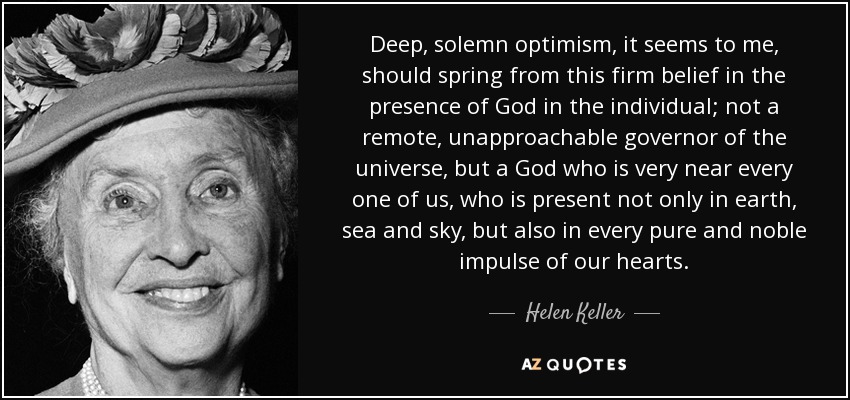Click here to return to Blog Post Intro

Optimism Within
It is a mistake always to contemplate the good and ignore the evil. There is a dangerous optimism of ignorance and indifference. As Keller noted, “Only by contact with evil could I have learned to feel by contrast the beauty of truth and love and goodness.”
Optimism that does not count the cost is like a house built on sand. A man must understand evil and be acquainted with sorrow before he can declare himself an optimist and expect others to believe that he has reason for the faith that is in him.
Keller states with conviction that the struggle which evil necessitates is one of the greatest blessings. It makes us strong, patient, helpful men and women. It lets us into the soul of things and teaches us that although the world is full of suffering, it is full also of the overcoming of it. Optimism, then, does not rest on the absence of evil, but on a glad belief in the preponderance of good and a willing effort always to cooperate with the good, that it may prevail.
Doubt and mistrust are the mere panic of timid imagination, which the steadfast heart will conquer, and the large mind transcend.
English historian John Richard Green tells us that the world is moved along, not only by the mighty shoves of its heroes, but also by the aggregate of the tiny pushes of each honest worker. Keller explained, “That thought alone suffices to guide me in this dark world.”
Optimism Without
In America, the optimist finds abundant reason for confidence in the present and hope for the future, and this hope, this confidence, may well extend over all the great nations of the earth. To be an American is to be an optimist.
The Practice of Optimism
Let pessimism once take hold of the mind, and life is all topsy-turvy, all vanity and vexation of spirit. No pessimist ever discovered the secrets of the stars, or sailed to an uncharted land, or opened a new heaven to the human spirit.
Thus the optimist believes, attempts, achieves. He stands always in the sunlight. Some day the wonderful, the inexpressible, arrives and shines upon him, and he is there to welcome it. His soul meets his own and beats a glad march to every new discovery, every fresh victory over difficulties, every addition to human knowledge and happiness.
Optimism is the faith that leads to achievement; nothing can be done without hope. It is because Christ is an optimist that for ages he has dominated the Western world. For nineteen centuries Christendom has gazed into his shining face and felt that all things work together for good.
Keller created a new creed of the optimist:
I believe in God, I believe in man, I believe in the power of the spirit. I believe it is a sacred duty to encourage ourselves and others; to hold the tongue from any unhappy word against God’s world, because no man has any right to complain of a universe which God made good, and which thousands of men have striven to keep good. I believe we should so act that we may draw nearer and more near the age when no man shall live at his ease while another suffers.
Keller concludes by saying, “Optimism is the harmony between man’s spirit and the spirit of God pronouncing His works good.”
May you find Optimism this day, this month, and this year, as you shoot for the stars!

